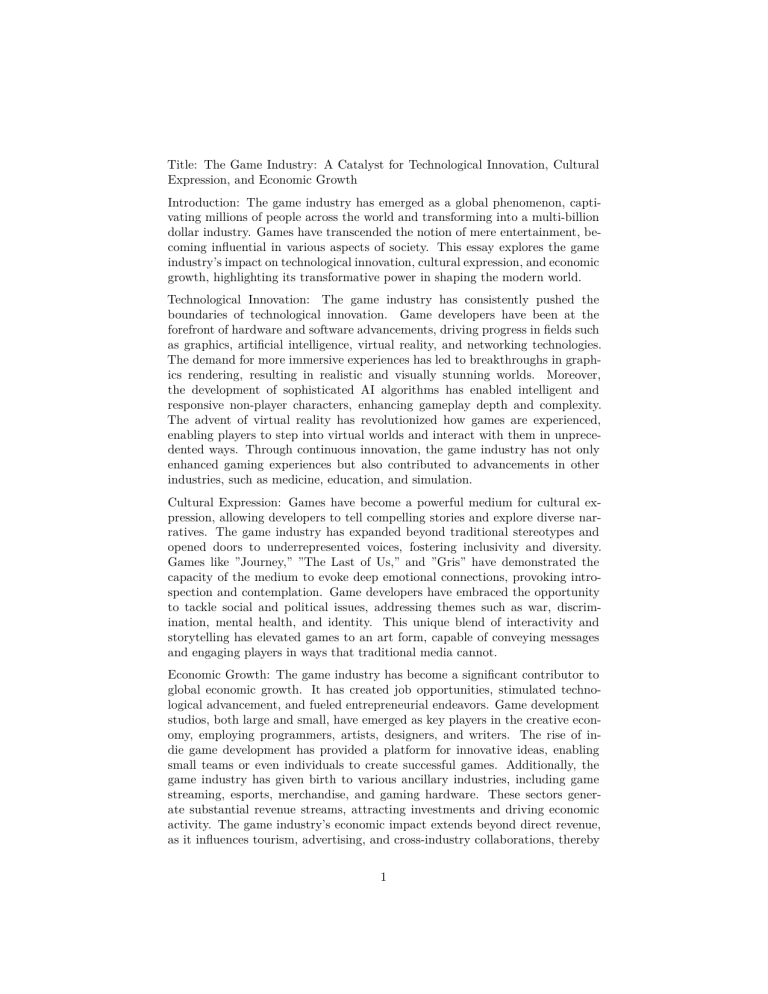
Title: The Game Industry: A Catalyst for Technological Innovation, Cultural Expression, and Economic Growth Introduction: The game industry has emerged as a global phenomenon, captivating millions of people across the world and transforming into a multi-billion dollar industry. Games have transcended the notion of mere entertainment, becoming influential in various aspects of society. This essay explores the game industry’s impact on technological innovation, cultural expression, and economic growth, highlighting its transformative power in shaping the modern world. Technological Innovation: The game industry has consistently pushed the boundaries of technological innovation. Game developers have been at the forefront of hardware and software advancements, driving progress in fields such as graphics, artificial intelligence, virtual reality, and networking technologies. The demand for more immersive experiences has led to breakthroughs in graphics rendering, resulting in realistic and visually stunning worlds. Moreover, the development of sophisticated AI algorithms has enabled intelligent and responsive non-player characters, enhancing gameplay depth and complexity. The advent of virtual reality has revolutionized how games are experienced, enabling players to step into virtual worlds and interact with them in unprecedented ways. Through continuous innovation, the game industry has not only enhanced gaming experiences but also contributed to advancements in other industries, such as medicine, education, and simulation. Cultural Expression: Games have become a powerful medium for cultural expression, allowing developers to tell compelling stories and explore diverse narratives. The game industry has expanded beyond traditional stereotypes and opened doors to underrepresented voices, fostering inclusivity and diversity. Games like ”Journey,” ”The Last of Us,” and ”Gris” have demonstrated the capacity of the medium to evoke deep emotional connections, provoking introspection and contemplation. Game developers have embraced the opportunity to tackle social and political issues, addressing themes such as war, discrimination, mental health, and identity. This unique blend of interactivity and storytelling has elevated games to an art form, capable of conveying messages and engaging players in ways that traditional media cannot. Economic Growth: The game industry has become a significant contributor to global economic growth. It has created job opportunities, stimulated technological advancement, and fueled entrepreneurial endeavors. Game development studios, both large and small, have emerged as key players in the creative economy, employing programmers, artists, designers, and writers. The rise of indie game development has provided a platform for innovative ideas, enabling small teams or even individuals to create successful games. Additionally, the game industry has given birth to various ancillary industries, including game streaming, esports, merchandise, and gaming hardware. These sectors generate substantial revenue streams, attracting investments and driving economic activity. The game industry’s economic impact extends beyond direct revenue, as it influences tourism, advertising, and cross-industry collaborations, thereby 1 contributing to regional development and economic diversification. Conclusion: The game industry stands as a testament to the transformative power of interactive entertainment. Through technological innovation, it has redefined the limits of what is possible in computing, propelling advancements in various fields. As a medium of cultural expression, games have challenged norms, amplified marginalized voices, and explored complex themes. Furthermore, the game industry has spurred economic growth, creating jobs, driving entrepreneurship, and expanding into diverse sectors. As games continue to evolve and reach new audiences, their potential to shape society, bridge cultural divides, and inspire the next wave of technological breakthroughs remains immense. 2




